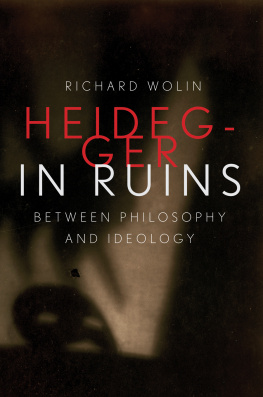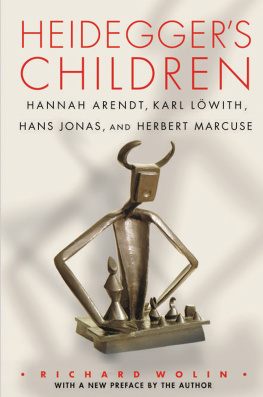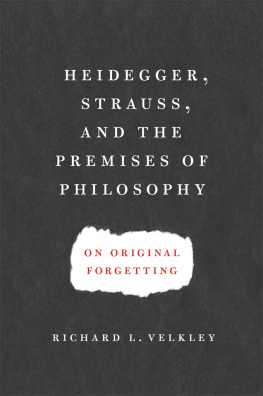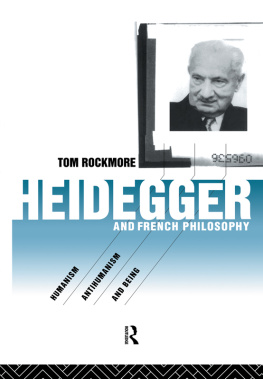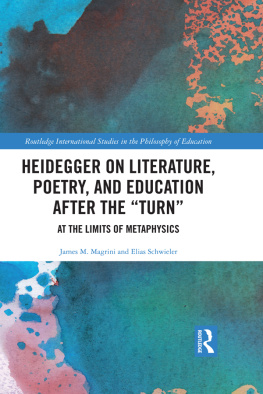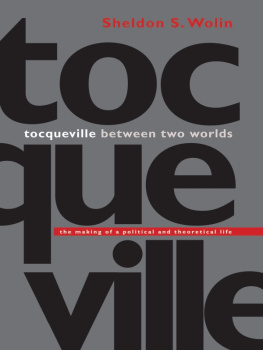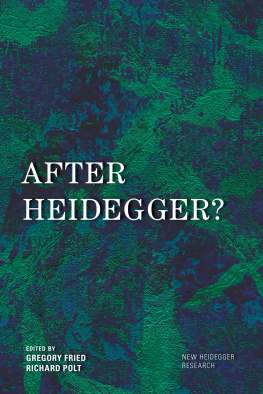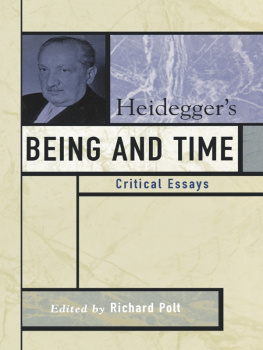Richard Wolin - Heidegger in Ruins
Here you can read online Richard Wolin - Heidegger in Ruins full text of the book (entire story) in english for free. Download pdf and epub, get meaning, cover and reviews about this ebook. publisher: Yale University Press, genre: Science. Description of the work, (preface) as well as reviews are available. Best literature library LitArk.com created for fans of good reading and offers a wide selection of genres:
Romance novel
Science fiction
Adventure
Detective
Science
History
Home and family
Prose
Art
Politics
Computer
Non-fiction
Religion
Business
Children
Humor
Choose a favorite category and find really read worthwhile books. Enjoy immersion in the world of imagination, feel the emotions of the characters or learn something new for yourself, make an fascinating discovery.
- Book:Heidegger in Ruins
- Author:
- Publisher:Yale University Press
- Genre:
- Rating:4 / 5
- Favourites:Add to favourites
- Your mark:
- 80
- 1
- 2
- 3
- 4
- 5
Heidegger in Ruins: summary, description and annotation
We offer to read an annotation, description, summary or preface (depends on what the author of the book "Heidegger in Ruins" wrote himself). If you haven't found the necessary information about the book — write in the comments, we will try to find it.
Heidegger in Ruins — read online for free the complete book (whole text) full work
Below is the text of the book, divided by pages. System saving the place of the last page read, allows you to conveniently read the book "Heidegger in Ruins" online for free, without having to search again every time where you left off. Put a bookmark, and you can go to the page where you finished reading at any time.
Font size:
Interval:
Bookmark:
HEIDEGGER IN RUINS
OTHER BOOKS BY RICHARD WOLIN
Walter Benjamin: An Aesthetic of Redemption
The Politics of Being: The Political Thought of Martin Heidegger
The Heidegger Controversy: A Critical Reader (editor)
The Terms of Cultural Criticism: The Frankfurt School, Existentialism, Poststructuralism
Karl Lwith, Martin Heidegger and European Nihilism (editor)
Labyrinths: Explorations in the Critical History of Ideas
Heideggers Children: Hannah Arendt, Karl Lwith, Hans Jonas, and Herbert Marcuse
The Seduction of Unreason: The Intellectual Romance with Fascism from Nietzsche to Postmodernism
The Frankfurt School Revisited and Other Essays on Politics and Society
Herbert Marcuse, Heideggerian Marxism (coeditor)
The Wind from the East: French Intellectuals, the Cultural Revolution, and the Legacy of the 1960s

Published with assistance from the foundation established in memory of Henry Weldon Barnes of the Class of 1882, Yale College.
Copyright 2022 by Richard Wolin.
All rights reserved.
This book may not be reproduced, in whole or in part, including illustrations, in any form (beyond that copying permitted by Sections 107 and 108 of the U.S. Copyright Law and except by reviewers for the public press), without written permission from the publishers.
Yale University Press books may be purchased in quantity for educational, business, or promotional use. For information, please e-mail (U.K. office).
Set in Times Roman and Scala Sans type by IDS Infotech Ltd., Chandigarh, India
Printed in the United States of America.
Library of Congress Control Number: 2022931859
ISBN 978-0-300-23318-6 (hardcover : alk. paper)
A catalogue record for this book is available from the British Library.
This paper meets the requirements of ANSI/NISO Z39.48-1992 (Permanence of Paper).
10 9 8 7 6 5 4 3 2 1
For Caroline, ma femme lumineuse
Error of philosophers: The philosopher believes that the value of his philosophy lies in the whole, in the building. But posterity discovers it in the bricks that he used and which others will often make use of again for better building; in the fact, that is to say, that the building can be destroyed and nevertheless possess value as material.
Nietzsche, Human, All Too Human (1878)
CONTENTS
A NOTE ON SOURCES
IN ADDITION TO HEIDEGGER S BEING a prolific philosopheras his hundred-plus volume Gesamtausgabe readily attestshe was also a prolific letter writer. Over the course of his long, productive life (19101976), he corresponded with some two hundred interlocutors. Over ten thousand of Heideggers letters remain extant.
After some initial hesitancy, Heidegger ultimately signed off on the publication of his correspondence. He viewed the Briefausgaben as an integral part of his Gesamtwerk, or oeuvre. In keeping with Heideggers directives, in 2010 there began, under the auspices of the Freiburg-based Karl Alber Verlag, an ambitious project to publish a thirty-five-volume edition of Heideggers correspondence.
In this book, I have, at various points, relied on the informative accounts concerning Heideggers philosophical path that he himself provided in these various epistolary exchanges. Conversely, for the most part, orthodox Heideggerians have steered clear of the letters, which they view as a form of non- or extraphilosophical discourse (although one would think that, in light of their allegiance to Heideggers program of Overcoming Metaphysics, the disruptive effects of epistolary testimony might offer a welcome to source of otherness). In this note, I wish to explain my decision to rely on the letters as a valuable and legitimate source for understanding the twists and turns of Heideggers Denkweg.
Heideggers correspondence is intellectually significant for several reasons. For one, it is widely acknowledged that, as Heidegger was a philosopher of Existenz, many of his fundamental philosophical impulses derived from his own life experiences: his conversion to Protestantism circa 1917, the Kriegerlebnis (war experience) of World War Ithe defining event of Heideggers Generationthe collapse of the Weimar Republic, and the rise of National Socialism.
Heideggers letters offer invaluable testimony concerning the ways that these transformative existential episodes impacted his Denken. As Heidegger avowed in a letter to Karl Lwith of 19 August 1921: I work in a concrete factical manner, from out of my I amfrom out of my spiritual, factical heritage/milieu/life context, from out of that which becomes accessible to me as living experience. To discount the letters would be to neglect the existential basis or ground of Heideggers thought.
Moreover, Heideggers correspondence includes exchanges with some of the outstanding figures in twentieth-century philosophy and letters: among them, Heinrich Rickert, Karl Jaspers, Rudolph Bultmann, Hannah Arendt, Hans-Georg Gadamer, Ernst Jnger, and Ren Char. In these cases, Heideggers letters are, quite obviously, of intrinsic philosophical and/or cultural significance.
Equally revealing are Heideggers epistolary exchanges with close friends and family members such as Elisabeth Blochmann, Elfride Heidegger (the philosophers wife), and his brother, Fritz. This is true insofar as, in the course of these colloquies, Heidegger often paused to shed invaluable light on the nature and substance of his philosophical trajectory.
Lastly, such conceptual clarification is especially welcome in the case of a philosopher like Heidegger who, in keeping with his emphatic disavowal of publicness, inclined toward hermeticism. As Heidegger avowed in Contributions to Philosophy (193638), Only the great and secretive individuals ensure the stillness necessary for the advent of the god.
Given Heideggers predilection for philosophical esoterics, the elucidations that the letters provide remain valuable and indispensable.
HEIDEGGER IN RUINS
INTRODUCTION
Heidegger in Black
The Ontological Privilege of German Dasein
THE BLACK NOTEBOOKS PUBLICATION , BEGINNING IN 2014, has generated a new wave of Heidegger scholarship. To date, eight installments, comprising volumes 94101 of the mammoth, 102-volume Heidegger Gesamtausgabe, have appeared. (For purposes of comparison, the comprehensive Hegel edition published by Felix Meiner Verlag, which was completed in 2018, contains only 47 volumes.) In light of the fact that the Notebooks have added nearly three thousand pages of source material to Heideggers voluminous corpus, it is understandable that scholars have felt compelled to reassess Heideggers legacy in the wake of their publication. In Poesie der Vernichtung: Literatur und Dichtung in Martin Heideggers Schwarzen Heften, Judith Werner has justifiably characterized the Black Notebooks publication as an earthquake that provoked a far-reaching caesura in Heidegger scholarship.
As a philosophical notebook or diary that Heidegger meticulously maintained over the course of four decades, from 1931 to 1969, the Black Notebooks are unique. They provide unprecedented insight into the gestation of Heideggers thought: a metacommentary that sheds significant light on Heideggers philosophical development and self-understanding, especially with respect to his Turn from existential ontology to the history of Being. They are also unique insofar as they vividly document Heideggers philosophical engagement with the Zeitgeist: the interplay between fundamental ontology and
Next pageFont size:
Interval:
Bookmark:
Similar books «Heidegger in Ruins»
Look at similar books to Heidegger in Ruins. We have selected literature similar in name and meaning in the hope of providing readers with more options to find new, interesting, not yet read works.
Discussion, reviews of the book Heidegger in Ruins and just readers' own opinions. Leave your comments, write what you think about the work, its meaning or the main characters. Specify what exactly you liked and what you didn't like, and why you think so.

